Learning at work used to be kind of… meh.
Endless PDFs. Clunky systems and “training” that felt more like a chore than a chance to grow.
But that was the old world.
In 2025, L&D teams want more.
Learners expect better, and Learning Experience Platforms or ‘LXPs’ are making it all happen.
So, whether you’re leading L&D at a fast-growing SME or you’re a one-person team looking to level up your learning game, this one’s for you.👇
But first…What is an LXP? And Why Should SMEs Care?
An LXP is built for the modern learner.
Think:
- Personalisation
- Social learning
- AI recommendations
- Content people actually want to engage with.
Where old-school LMSs are top-down and admin-heavy, LXPs are learner-first and intuitive.
And for small and mid-sized businesses (SMEs), that matters. Because when your team’s lean, you don’t have time for clunky.
You need something simple. Smart. Scalable. Like Thirst! (Sorry, we’ll get to that!)
LMS vs LXP: What’s the Difference?
LMS
- Compliance-focused.
- Admin controls everything.
- Top-down content delivery.
- Built for managing.
LXP
- Learner-focused.
- Learner drives the experience.
- Curated, personalised learning.
- Built for engaging.
Want the full breakdown? Check this out 👉 LXP vs LMS: What’s the Difference? (2025 Guide)
Why LXPs Are a Big Deal in 2025
Here’s what makes LXPs so powerful for today’s teams:
✅ Personalised learning (tailored to roles, goals, and skills)
🚀 AI recommendations (learning in the flow of work)
🎯 Skills development (mapped to career paths)
🧠 Smart content curation (from internal + external sources)
💬 Social learning (comments, sharing, collab)
🤩 Modern UI (mobile-first, clean, and easy to use)
📈 Next-level engagement (because boring = forgotten)
Okay, now we’ve whizzed through that, let’s get to the part you’ve all been waiting for!
The 12 Best Learning Experience Platforms in 2025
We understand that you haven’t got time to read realms and realms of information, so this is the snappy 411.
1. Thirst
If you’re after a learning platform that actually gets what SMEs need—speed, simplicity, and serious customisation – this is it. Thirst combines a clean UI with built-in AI to help teams learn, grow, and scale without the faff.
🔍 Best for: Customisable, AI-powered learning for SMEs.
Key Features:
- AI content curation & recommendations
- Personalisation engine
- Integrations with your existing tools
Pros
- Fully customisable
- Beautiful UX
- Built-in AI = colossal time saver
Cons
- Currently focused on SMEs (but growing fast 👀)
Thirst pricing has a flexible plan for every kind of team 💰
Core Package 🛠️
Perfect for teams getting started.
- Access to Thirst’s knowledge base.
- Unlimited storage.
- AI-powered recommendations.
- Reporting, insights, and trends.
Growth Package 📈
Ideal for growing teams ready to level up.
- Everything in Core, plus:
- Dedicated customer success manager
- Integration with your existing systems
- Personalised onboarding
- Fully customisable platform
- FREE implementation & migration
- Unlimited hosting & Single Sign-On (SSO)
- Minimum 100 users
Premium Package🥇
For large teams with ambitious goals.
- Everything in Growth, plus:
- Advanced user groups & permissions
- Fully customisable certifications
- Dedicated technical support
- Real-time chat support
- Custom analytics dashboards
- Tailored onboarding & training
- Minimum 5,000 users
No matter your team size, Thirst has a plan to match your needs and budget.
2. 360Learning
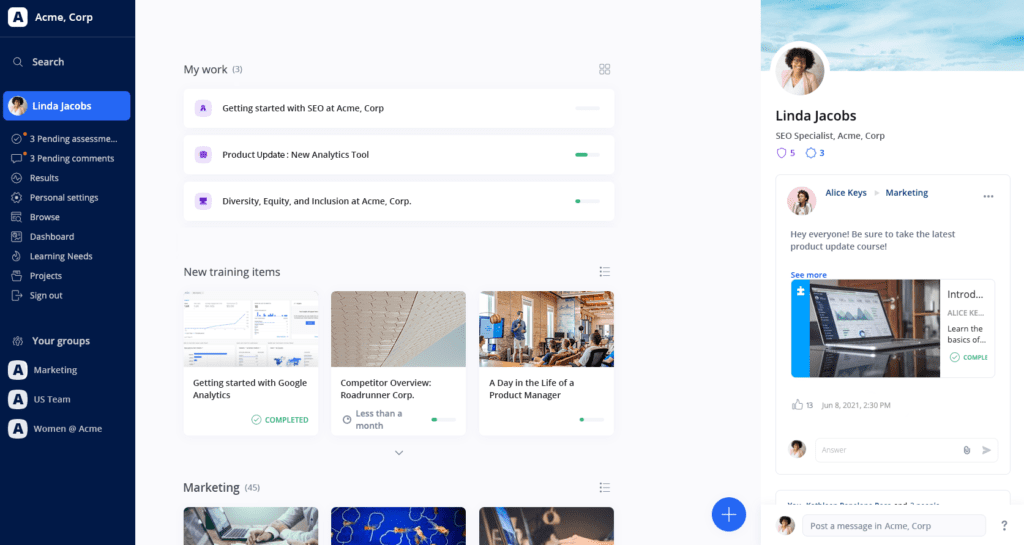
Want your internal experts to become learning rockstars? 360Learning makes it easy to turn peer knowledge into powerful, scalable learning. It’s all about collaborative creation and making learning a team sport.
💡 Best for: Collaborative, peer-led learning
Key Features:
- Built-in course authoring tools
- Peer feedback and collaboration features
- Learning campaigns and nudges
- SCORM and xAPI compatibility
Pros:
- Empowers subject matter experts to share knowledge
- Easy content creation and iteration
- Focuses on social and collaborative learning
Cons:
- The interface can feel busy with too many elements.
- It may require a cultural shift toward peer-led learning.
Pricing
- $8 a month.
- Free trial available.
- There is no free version.
3. Docebo
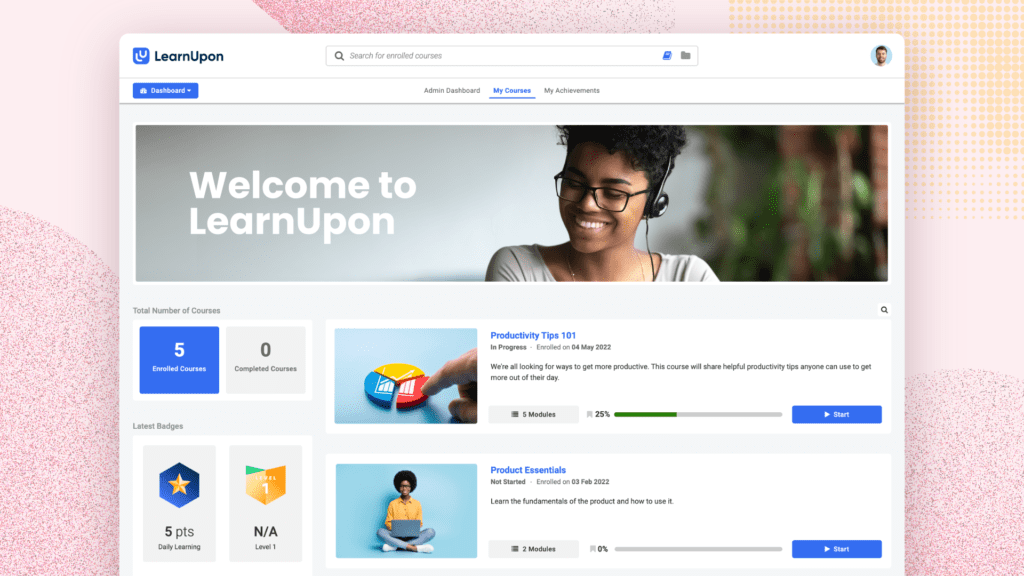
Got big goals and a global workforce? Docebo brings serious enterprise muscle with built-in AI to scale learning across borders, roles, and business units. It’s feature-rich, flexible, and built to handle complexity.
🏢 Best for: Enterprise-grade learning with powerful AI
Key Features:
- AI-powered skills mapping and content curation
- Extended enterprise and customer training support
- Gamification, mobile learning, and certifications
- Integration marketplace with 400+ apps
Pros:
- Highly scalable for global teams
- Advanced AI for learning personalisation
- Robust analytics and custom dashboards
Cons:
- Pricing can increase quickly with add-ons
- Admin interface has a steeper learning curve
Pricing
- $25,000 a year.
- There is no free trial.
- There is no free version.
4. Degreed
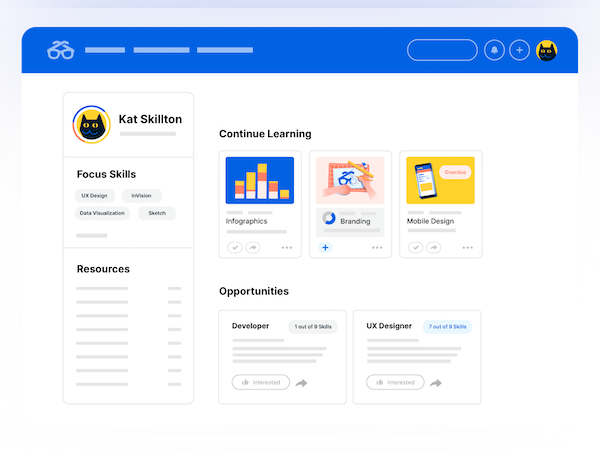
Looking to build skills and unlock internal mobility? Degreed focuses on helping people grow in their roles and careers by mapping learning directly to skills. Great for organisations serious about long-term development.
📚 Best for: Skills-based learning and internal mobility
Key Features:
- Skills library and custom career frameworks
- Aggregation of internal and external learning content
- Role-based learning plans
- Real-time skills tracking
Pros:
- Excellent for skills development at scale
- Supports a continuous learning culture
- Integrates with most major HR platforms
Cons:
- UI lacks flexibility/customisation
- Skills taxonomy can be overwhelming
Pricing
- You’d have to contact Degreed directly for their pricing structure.
- Free version available.
- No Free trial.
5. EdCast by Cornerstone

Part LXP, part knowledge hub, EdCast is all about surfacing the right learning at the right time. Whether it’s formal content or informal knowledge, EdCast connects learners with what they need – wherever it lives
🔍 Best for: Enterprise learning and knowledge discovery
Key Features:
- AI-powered content discovery
- Smart search across systems
- Unified learning + productivity platform
- Support for informal learning and microlearning
Pros:
- Great for content discovery and continuous learning
- Powerful search and content surfacing
- Enterprise-grade security and compliance
Cons:
- Long implementation timelines
- It can be overwhelming without a clear curation strategy
Pricing
- No pricing is available; you’d have to contact EdCast directly.
- There is no free version.
- There is no free trial.
6. HowNow
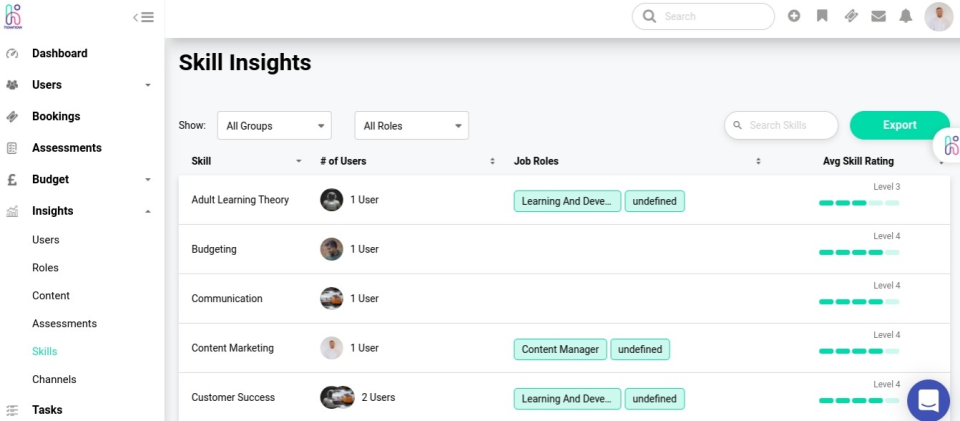
Need learning to feel as seamless as a Google search? HowNow puts learning directly in your team’s workflow – inside the tools they already use. Great for fast-paced teams who value speed and simplicity.
⚡ Best for: Fast-paced teams and just-in-time learning
Key Features:
- Contextual learning in the flow of work (e.g. Chrome, Slack)
- Smart content recommendations
- Knowledge library and course builder
- Integrations with 30+ workplace tools
Pros:
- Super modern, minimal UI
- Easy to get started and lightweight to maintain
- Great for just-in-time learning
Cons:
- Lacks deep reporting and analytics
- Relies on curated
Pricing
- £52 a year.
- Free trial available.
- There is no free version.
7. Learn Amp
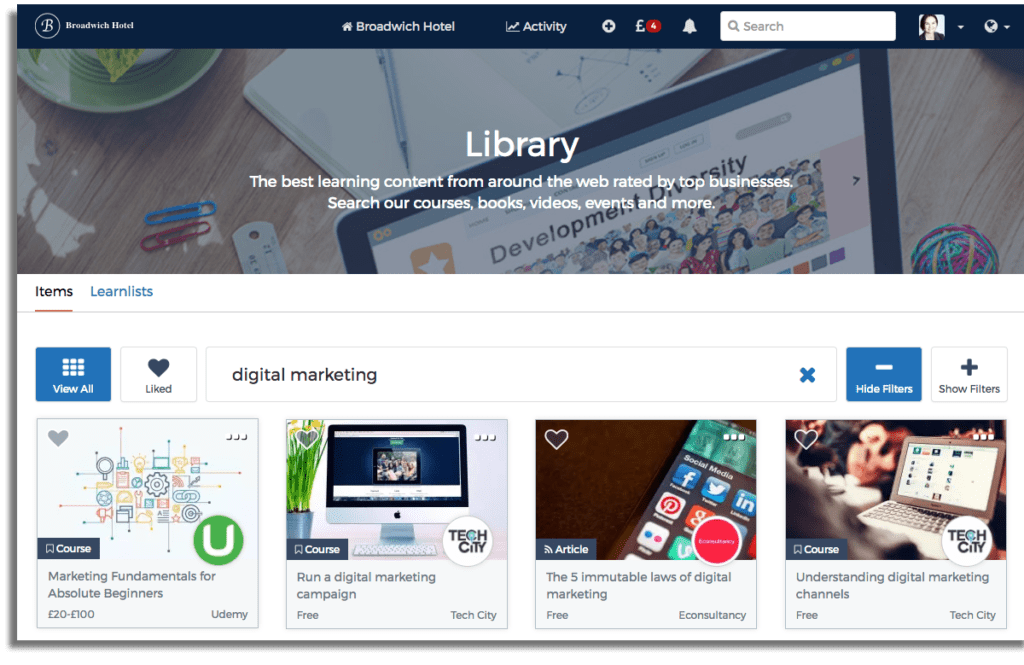
Trying to connect learning with performance and engagement? Learn Amp brings everything together—from content and career paths to feedback and goals—so teams can learn, grow, and thrive in one space.
📈 Best for: Blending learning with performance management
Key Features:
- Learning paths tied to performance goals
- Employee feedback and engagement tools
- Built-in content authoring
- Social and collaborative learning tools
Pros:
- Combines learning and employee performance in one place
- Clear progression and development paths
- Excellent support team
Cons:
- It takes time to unlock the full potential
- Less suited to large, multi-language global teams
Pricing
- $4 a month.
- There is no free version.
- Free trial available.
8. Fuse
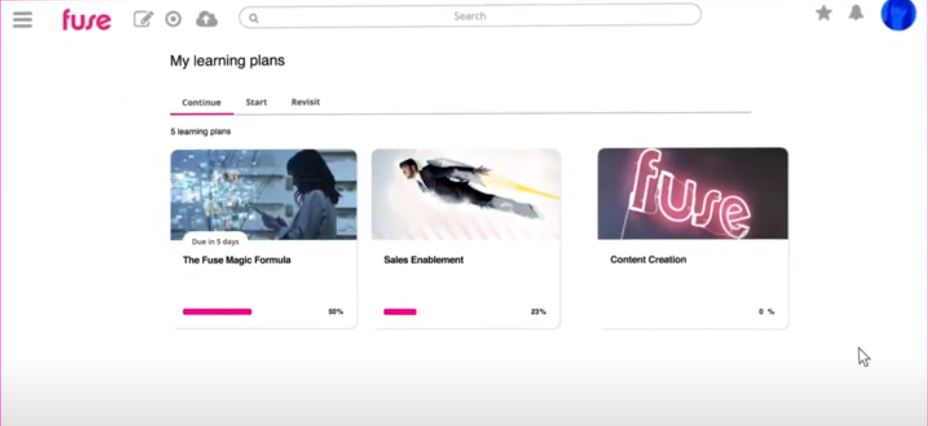
If video is your team’s love language, Fuse is the LXP that puts social, visual learning front and centre. It encourages people to share knowledge, collaborate, and engage with content that feels more like YouTube than school.
📹 Best for: Social, video-first learning environments
Key Features:
- AI-powered search and video transcription
- Community-driven content sharing
- Mobile-first design
- Built-in analytics and heatmaps for video engagement
Pros:
- It is a fantastic video-learning experience
- Strong social learning capabilities
- Encourages continuous, organic learning
Cons:
- The video-first model might not suit every organisation
- Some parts of the UI feel dated on the admin side
Pricing
- You’d have to contact Fuse directly for more information.
9. Learning Pool LXP
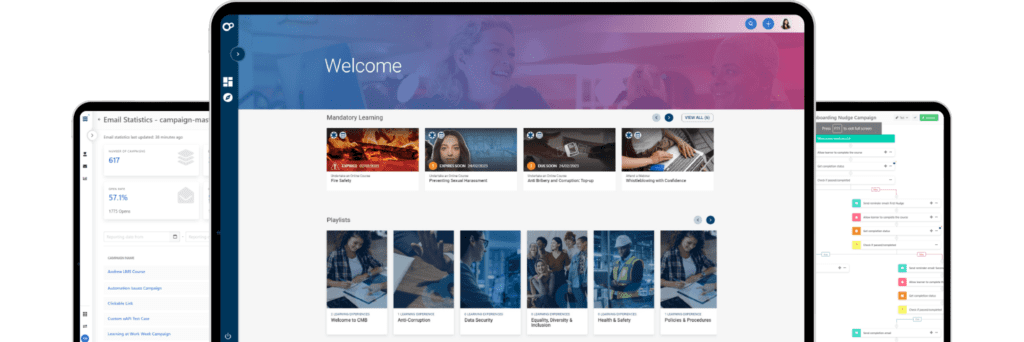
Already in the Learning Pool ecosystem? Their LXP connects data, automation, and personalisation to help you deliver the right content, at the right time, to the right people. Think precision learning, powered by insight.
📊 Best for: Personalised learning experiences powered by data and automation
Key Features:
- Adaptive learning paths based on behavioural and performance data
- Seamless integration with Learning Pool’s wider ecosystem (LMS, content,
- analytics)
- Smart curation, AI-powered recommendations
- Extensive reporting and learning analytics dashboards
Pros:
- Strong personalisation using xAPI and rich data tracking
- Great for organisations already using Learning Pool tools
- Powerful automation for delivering targeted content
Cons:
- Best suited for organisations already in the Learning Pool ecosystem
- UI is not as modern or flexible as some standalone LXPs
Pricing
- You’d need to contact Learning Pool directly for more information.
10. Valamis
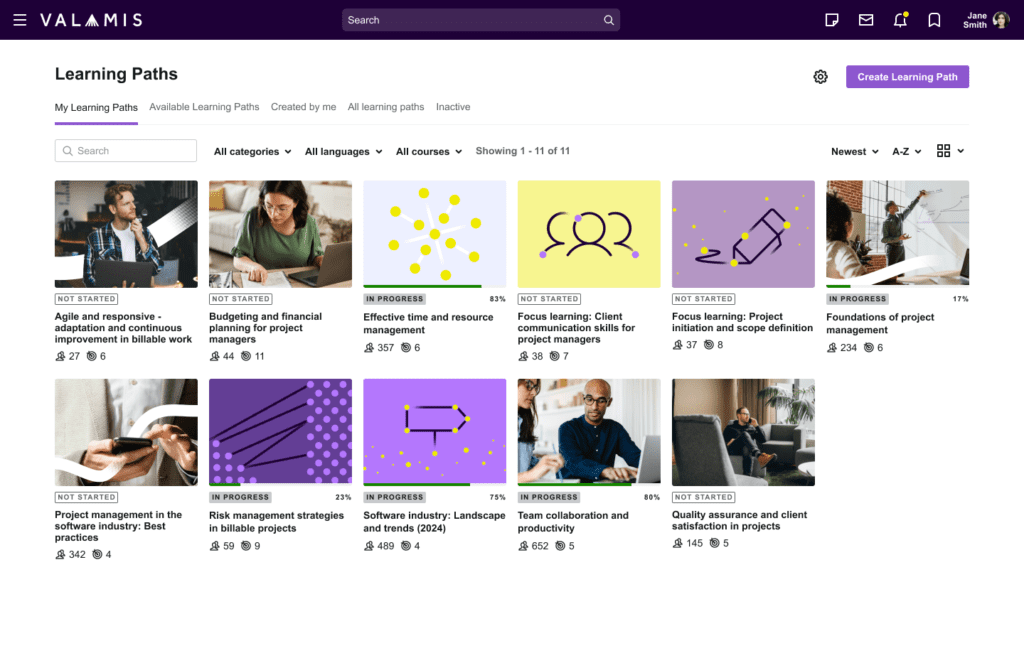
Need to blend formal training with informal learning on a global scale? Valamis is made for complexity, offering support for standards like SCORM and xAPI while helping teams curate content and track impact.
🌍 Best for: Blending formal and informal learning
Key Features:
- SCORM, xAPI, and LRS support
- Learning paths and gamification
- Custom reporting dashboards
- Content curation and multi-language support
Pros:
- Excellent standards support (xAPI, SCORM)
- Suitable for global teams with complex needs
- Strong analytics features
Cons:
- UX is not as modern or intuitive as newer platforms
- Pricing is not always transparent online
Pricing
- $21,950,00 a year
- Free version available.
- Free trial available.
11. NovoEd

If you believe learning should happen with others – not alone – NovoEd delivers deep, collaborative experiences built around peer interaction. It’s a solid choice for high-touch, facilitator-led programmes like leadership or DEI.
👥 Best for: Cohort-based and social learning experiences
Key Features:
- Facilitator-led courses
- Group projects and collaboration tools
- Peer assessments and discussions
- Scalable for enterprise rollouts
Pros:
- Great for leadership, DEI, and soft skills training
- Deep collaboration and feedback loops
- Strong support for structured, high-impact programme
Cons:
- Less ideal for on-demand or microlearning
- Needs dedicated facilitation for the best
Pricing
- $35.00 a year.
- There is no free version.
12. eloomi
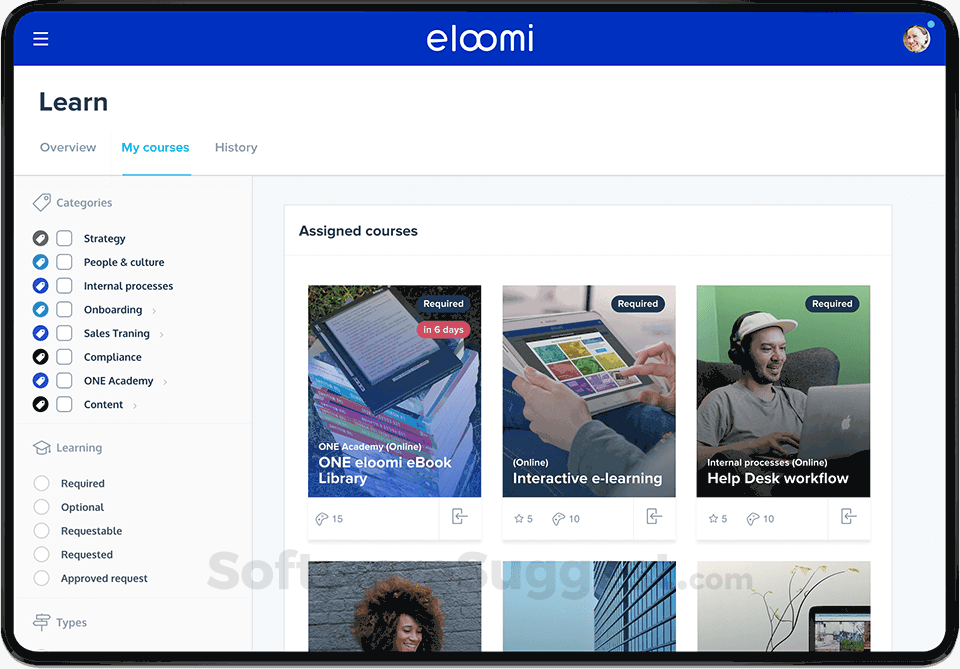
Looking for something clean, simple, and compliance-ready? eloomi is designed with small to mid-sized teams in mind, offering intuitive tools for learning, onboarding, and performance – all without the enterprise bloat.
✔️ Best for: SMBs and mid-sized businesses focused on simplicity and compliance
Key Features:
- Easy-to-use course builder and content management
- Performance management tools (1:1s, reviews, check-ins)
- Compliance tracking and certification
- Microlearning and pre-built content library
Pros:
- User-friendly for both learners and admins
- Strong for compliance and onboarding workflows
- Combines learning and performance in one tool
Cons:
- Limited scalability for complex enterprise needs
- Fewer personalisation and AI capabilities compared to newer LXPs
Pricing
- $2.50 a month.
- Free trial available.
- A free version is not available.
How to Choose the Right LXP for Your Team
Not all LXPs are created equal.
Here’s what to keep in mind:
✅ Does it align with your business goals?
🔌 Will it play nicely with your existing tools?
🧑💻 Is the UX clean, modern, and learner-friendly?
📊 How strong is the support, analytics, and scalability?
Need a deeper dive into LMS basics? We’ve got you 👉 What is a Learning Management System?
Final Thoughts
If 2024 was the year AI entered the chat, 2025 is the year smart L&D teams actually use it. And LXPs are where it all happens.
So, whether you’re just starting out on your L&D journey or looking to level up, the right learning platform isn’t just a “nice to have.”
It’s how you:
- Engage your people
- Develop their skill
- Futureproof your business
Need help finding your fit? We’re always happy to chat 💬
Take a guided tour today and see Thirst in action.
Why not check out the Thirst blog – We’ve created plenty of in-depth comparison guides on all of the leading LXP and LMS’.
You may also enjoy:
What is Bloom’s Taxonomy? Definition, Benefits & How to Apply It | Skills-Based Organisation Playbook: Steps to Become One | 40 Must-Know Employee Retention Statistics







